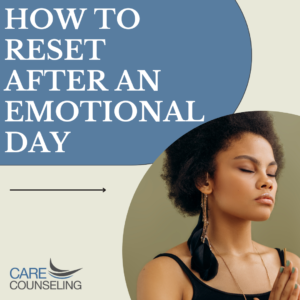Resetting After an Emotional Day
 We all have those days when our emotions run wild – whether it’s due to stress at work, conflicts in our personal lives, or unexpected challenges that catch us off guard. In this blog, we’ll explore effective strategies to help you reset and find peace and balance even after the most emotionally taxing days.
We all have those days when our emotions run wild – whether it’s due to stress at work, conflicts in our personal lives, or unexpected challenges that catch us off guard. In this blog, we’ll explore effective strategies to help you reset and find peace and balance even after the most emotionally taxing days.
- Acknowledge Your Emotions
The first step to resetting after an emotional day is to acknowledge your feelings. Suppressing or denying your emotions can make matters worse. Take a moment to identify and label what you’re feeling. Are you angry, sad, frustrated, or anxious? Understanding your emotions is the first step toward managing them.
- Practice Mindfulness
Mindfulness is a powerful tool for resetting after emotional upheaval. It involves being fully present in the moment, without judgment. Engage in mindful breathing or meditation exercises to calm your mind and reduce stress. Focus on your breath and allow your emotions to come and go without attaching judgment to them.
- Vent or Journal Your Feelings
Sometimes, simply talking about your emotions or writing them down can be incredibly therapeutic. Find a trusted friend or family member to vent to, or if you prefer privacy, start a journal. Expressing your emotions through words can help you process them and gain perspective.
- Physical Activity
Physical activity is a great way to release pent-up emotions and reset your mood. Whether it’s a brisk walk, a jog, or a yoga session, exercise can help reduce stress, increase endorphins (the “feel-good” hormones), and improve your overall well-being.
- Create a Relaxing Environment
Set the stage for relaxation by creating a soothing environment. Light some candles, play calming music, or take a warm bath. These sensory experiences can help you unwind and find peace.
- Disconnect from Technology
In today’s digital age, we are constantly bombarded with information and notifications. Take a break from screens and disconnect from technology for a while. Engaging in activities without distractions can be incredibly rejuvenating.
- Practice Self-Care
Self-care isn’t selfish; it’s essential for your mental and emotional well-being. Treat yourself to something you enjoy – whether it’s a favorite book, a cup of tea, or some quiet time to pursue a hobby. Self-care is a vital aspect of resetting after an emotional day.
- Deep Breathing Exercises
Deep breathing exercises can help calm your nervous system and reduce the physiological effects of stress. Try the 4-7-8 technique: inhale for a count of 4, hold for 7, and exhale for 8. Repeat this several times to reset your body and mind.
- Seek Support
If the emotional day was particularly challenging or if you find yourself unable to reset on your own, don’t hesitate to seek support. Reach out to a therapist or counselor who can provide guidance and tools to help you manage your emotions.
- Plan for Tomorrow
Before you go to bed, take a few minutes to plan for the following day. Having a clear plan can reduce anxiety and give you a sense of control over your circumstances. It’s also a way to ensure you’re setting yourself up for a smoother day ahead.
Resetting after an emotional day is not about erasing your emotions but about finding balance and inner peace despite them. By acknowledging your feelings, practicing mindfulness, engaging in self-care, and seeking support when needed, you can regain your emotional equilibrium and face each day with renewed strength and resilience.



























